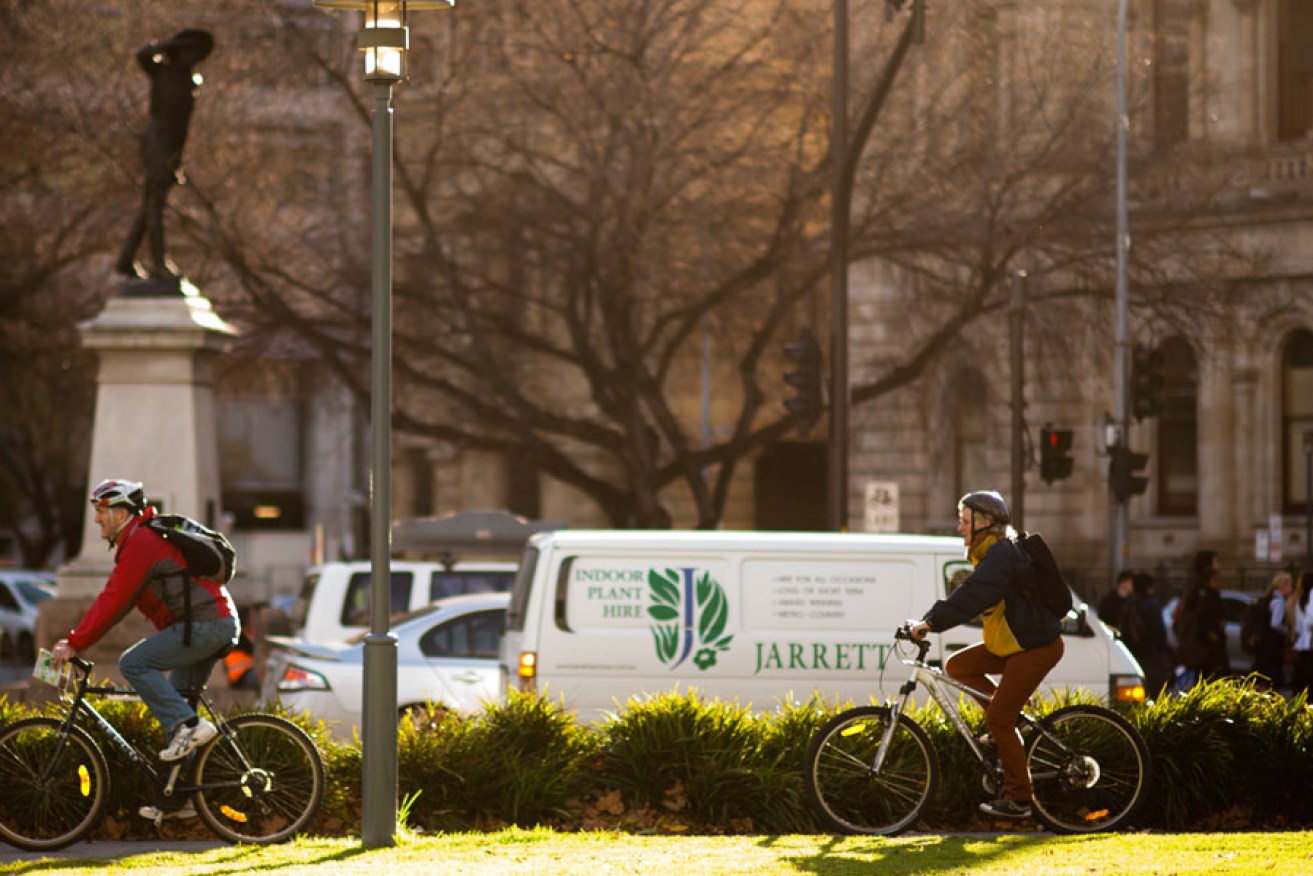Energy, food, ideas: SA’s keys to growth

Talented people want a city that's bikeable, walkable and where they can be close to other innovative businesses. Photo: Nat Rogers/InDaily
The Commonwealth Government’s Audit Commission report may not be appealing reading to all, but it does reflect challenges facing all of Australia’s economies.
South Australia’s economy is facing more of these challenges than most.
We don’t have the levels of growth we need. We have limited domestic demand. We have resources that can only be spread so far.
This is why the Committee for Adelaide has worked across the community over recent months on an ‘Agenda for Growth’.
We must grow, because we must generate the means to invest in our people, their ideas, and their ventures.
Getting growth right means attracting talented people from around Australia and the world with skills and resources to start new ventures here; teaming private sector innovation with public services better suited to the 21stC, and accessing the capital we need for the infrastructure we need to grow.
Adelaide and South Australia is in a competition for those talented people and for businesses looking to set up, grow and develop. And we are in a competition for capital. Boards and businesses choose where they invest – across a portfolio that may include Parramatta, Geelong, Perth and Adelaide. So why invest here?
Not because of quality of life. A CEO doesn’t uproot headquarters because of fine food and wine festivals (sure, it’s a big plus). They choose a city because of the networks they find and because they can access what they need. So what do they need?
The Brookings Institution in the US put it best:
Talented people want to work and live in urban places that are walkable, bikeable, connected by transit, and hyper-caffeinated. Major companies across multiple sectors are practicing “open innovation” and want to be close to other firms, research labs, and universities. Entrepreneurs want to start their companies in collaborative spaces, where they can share ideas and have efficient access to everything from legal advice to sophisticated lab equipment.
So what does this mean for us?
Our universities and our research centres should rank in the global top 100 if we want to offer companies access to R&D.
International students should be seen as more than a revenue stream for classrooms if we want them to stay and be part of a ‘brain gain’.
Corporate headquarters should be courted, and the SME sector supported if we want job creation and a sustainable enterprise ecosystem.
Jobs grow where the infrastructure’s in place – so our urban and regional infrastructure priorities must build the city Brookings talks about.
Wherever we go, whoever we speak to, we hear the same message – we don’t need new bodies or more ideas. We need the ideas we have joined up and applied. And possibly re-prioritised.
The committee sees its primary role as a connector – bringing evidence and support to the good ideas to help shepherd them through the dissent and resistance.
Another common message is that great things are underway, but not at the scale they need to really work. The Public Sector Renewal program is making a difference through a set of 90 Day Projects, but until now these have been mostly inside government, focused on government procedure.
We need government to be open and agile – with the means to deliver the services we want. But evidence shows more than 40% of local government just isn’t sustainable. At some point we need to address this if we want public services suited to the 21st century.
These aren’t unrelated ideas. And you probably can’t cherry pick from the menu. The truth is we do need to get serious about how and where we grow in Adelaide and its regions. Because if we don’t, the resources we have will continue to spread more thin and growth will stall.
We need vision, leadership and joint effort. For us, this means pinning our colours to the mast. Let’s be the state that says: “We will resource the world – with energy, food and ideas.”
This says exactly what we do well. It places us at the centre of what the world needs. It helps us make decisions about what’s important. And it gives us a common, global service model built around the needs of our markets and partners. But most importantly, it can be a practical guide that helps set our collective priorities and serve as an agenda for growth.
How do we hope to help?
The Committee for Adelaide is a not-for-profit incorporated association that brings together people from all walks of life, and organisations from across sectors with a shared purpose – to step up and do what we can to help grow Adelaide, South Australia.
We do not represent a defined sector, nor do we seek to push one sector’s agenda. We realize we must represent diversity but also come together to promote tough decisions.
We’re self-funded, so we’re independent. We can be fearless in naming the challenge.
We’re an alliance of large and small from all backgrounds; government, private sector, not for profit and social enterprise so our networks are wide.
We’re non-partisan and apolitical, so solutions can be pragmatic – driven by evidence of what works, not by ideology or the election cycle.
We’re diverse, so we can draw on expertise beyond the usual, harnessing skills from networks that often go untapped.
Colin Goodall is the Chair of the Committee for Adelaide.




